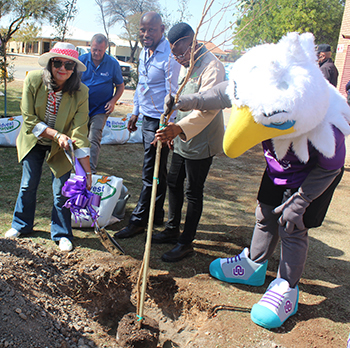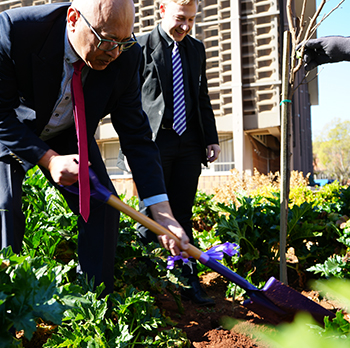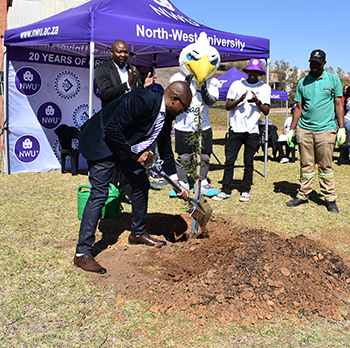By Loveness Hulwane
In celebration of Arbor Week, held annually from 1 to 7 September, the North-West University (NWU) community planted 20 trees on each of the NWU campuses.
These tree planting ceremonies were also part of the university's 20-year anniversary celebrations, symbolising the enduring legacy of the NWU over the past two decades.
The NWU selected the Karee tree, native to the North West province and named Tree of the Year for 2024, for its cultural significance, resilience and their ability to support local wildlife. A total of 20 trees – 10 Searsia lancea (Common Karee) trees and 10 Searsia leptodictya (Mountain Karee) trees – were planted on each campus.
Prof Sonia Swanepoel, deputy vice-chancellor for community engagement and Mahikeng Campus operations, led staff and students in the tree-planting ceremony on the Mahikeng Campus. She emphasised the campus’s commitment to maintaining a litter-free environment, with students actively involved in keeping the grounds clean. She mentioned that the selected trees are fast-growing and require minimal water, making them well-suited for the campus. She also highlighted the importance of preserving the campus's beauty and praised the students for their ongoing efforts in this regard.
“The campus management is proud of our students’ dedication, and we plan to further enhance the campus’s beauty by adding 400 new roses, building on the 200 planted last year.”
Prof Daryl Balia, deputy vice-chancellor for information technology and Potchefstroom Campus operations, reflected on the symbolic importance of the tree planting initiative on the Potchefstroom Campus.
"Planting 20 trees today represents a lasting legacy that will nurture both our planet and future generations. Each tree contributes to cleaner air, supports biodiversity, and helps combat climate change. By planting a tree today, we are cultivating hope and creating a healthier world for tomorrow," he said.
He further shared that trees have a profound legacy, deeply connected to the environment, culture and human history. "For millennia, trees have provided shelter, food and resources, shaping both civilizations and ecosystems. Their legacy lies not just in their physical presence, but also in the enduring impact they have on our planet and society. My hope is that the 20 trees we plant today will serve as beacons of hope for future generations of students.”
Prof Sibusiso Chalufu, acting deputy vice-chancellor for Vanderbijlpark Campus operations and executive director for student life, highlighted the broader significance of Arbor Week during the ceremony on the Vanderbijlpark Campus. He underscored the crucial role that trees play in sustainable development, environmental preservation, and improving people’s livelihoods. He also encouraged communities to participate in greening activities within their surroundings.
“These trees symbolise our commitment not only to sustainable environmental development, but also to the future growth and sustainability of our university and its campuses,” said Prof Chalufu.

Prof Sonia Swanepoel, deputy vice-chancellor for community engagement and Mahikeng Campus operations, and NWU mascot Eagi plant a tree.

Prof Daryl Balia, deputy vice-chancellor for information technology and Potchefstroom Campus operations, and Reuben Coetzer, chairperson of the Student Campus Council, get their hands dirty.

Prof Sibusiso Chalufu, acting deputy vice-chancellor for Vanderbijlpark Campus operations and executive director for student life, is cheered on while planting a tree.
